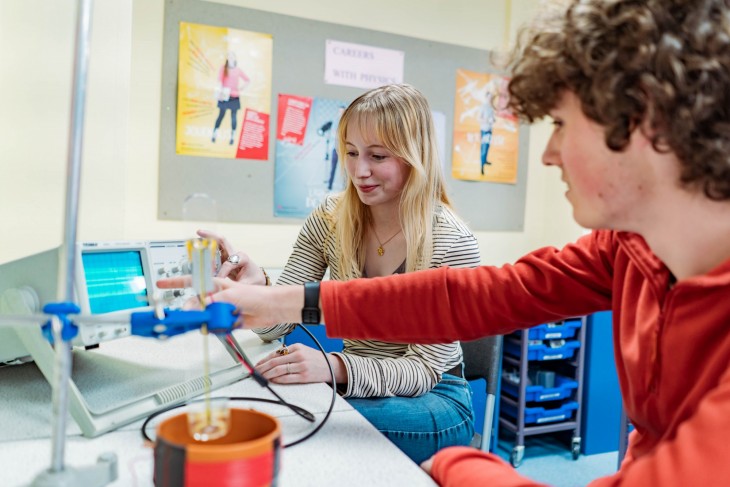Hereford Sixth Form College
Physics
Find a course
Physics A Level
At its heart, Physics is about learning how and why things behave as they do. Physics is vital to developments in the modern world, from space science to nanophysics, from medical treatments to mobile phones. Physics makes an impact on virtually every area of our lives.
Studying Physics offers a challenging but rewarding route to understanding the world around us.

Physics
What does the course involve?
You are expected to use the written and electronic resources available to develop your understanding of basic concepts outside of lessons. Lessons will concentrate on applying these concepts to explain observations and solve problems, particularly in unfamiliar situations.
Assessment
At the end of the second year there are three written exams, each lasting 2 hours. These exams cover all the content taught over the previous 2 years.
Each exam contributes one third to the overall A Level mark. There is no coursework.
Although there is no practical exam, practical skills will be regularly assessed by the tutor during the course. A final pass/fail grade will be awarded at the end. This grade will be shown as a separate line on your exam certificate but it does not contribute to your final A Level mark.
Topics studied
Topics in Year 1 include:
- Measurements and Their Errors.
- Particles and Quantum Physics.
- Waves.
- Mechanics and Materials.
- Electricity.
Topics in Year 2 include:
- Further Mechanics and Thermal Physics.
- Fields (Electric, Magnetic, Gravitational) and Their Consequences.
- Nuclear Physics.
- Astrophysics.

You will be loaned a Physics textbook and question book; revision guides will be available from the Library. You will need your own scientific calculator and 30cm ruler.
Please note: /404Certificate in Mathematical Studies must be studied alongside this course, unless you are also studying Mathematics or Statistics.
Opportunities
Students have the chance to enter the Physics Olympiad and attend trips to research centres, such as CERN or the Rutherford Appleton Laboratories in Oxford.
What can you do after the course?
You will gain a qualification in a highly regarded facilitating subject that will enable you to access many degree courses, apprenticeships and employment. The analytical and problem solving skills you develop are valued in careers not necessarily related to physics, for example management, finance, law and the civil service.
Many students go on to physics degrees and courses in engineering and technology.
If you wish to study physics or engineering at university you must also have A Level Maths.